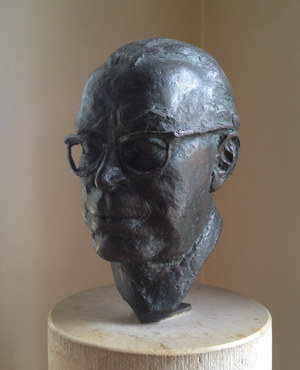Ernst Georg Schneider
( businessman) | |
|---|---|
 Bust of Ernst Schneider at the | |
| Born | 6 October 1900 Nidderau, Germany |
| Died | 22 September 1977 (Age 76) |
| Nationality | German |
German businessman who attended 2 Bilderbergs in the 1950s | |
Ernst Georg Schneider was a German businessman, and President of the Association of German Chambers of Industry and Commerce from 1963-69 during the Golden Age of German capitalism.
Career
After a short military service as a gunner in WW1, Schneider studied in Economics and Law at the University of Frankfurt.
Even before his doctorate (1922) he became a representative of an (unspecified) Swiss finance group from Basel, to take over control of their German investments as secretary to the management. He was initially also active several other companies, before he in 1925 became junior partner in businessman Siegfried Arndt's chemical company "Kohlensäure-Industrie AG" (KI-AG).
In 1932, he became full partner and took over the management of the group, which had expanded its holdings in the chemical-pharmaceutical-cosmetic industry. In the late 30s, Schneider expanded the conglomerate to the steel industry.
When Arndt (who was Jewish) was forced to emigrate after the Nazi takeover in 1933, first to Switzerland and later to the USA, Schneider took over his company shares, and "safeguarded his interests" by a cloaking agreement, until Arndt's return in 1945[1]. The official history also stresses how the company took over the factory Lingner-Werke and manufactured the mouth water ODOL, but any other activities of this important businessman in the period are skirted over. And the official history also conveniently claims Schneider got into conflict with the National Socialists and was briefly arrested in Cologne.
After the war, Schneider rebuilt the company in Düsseldorf in the Western Zone, bringing with him the management team of the Linger-Werke, the factory which now was in the Soviet Zone.
After Arndt's final withdrawal from the group in 1955, Schneider continued the consortium with participation from the banks C. G. Trinkaus and Berliner Handelsgesellschaft.
Other activities
In addition to numerous supervisory board memberships, he was President of the Düsseldorf Chamber of Commerce from 1949-68 and President of the important Association of German Chambers of Industry and Commerce from 1963-69. Since his word had great weight in the government in Bonn, Schneider was a welcome guest in interviews or discussions in the West German press landscape at the time.[2]
In 1956 he initiated the C. Rudolf Poensgen Foundation to promote the next generation of managers.
After the death of his only son in 1968, he sold his company shares in 1970 to “Preussag AG”.
Schneider, a passionate art collector, was able to save part of his vast and expensive collections of porcelain, faience and modern paintings from the Soviet troops when he moved West in 1945. He emerged as a sponsor and patron, and donated a large part of his collection of Meissen porcelain, the world's most important outside of the Dresden Zwinger Museum, to the Bavarian National Museum.
Events Participated in
| Event | Start | End | Location(s) | Description |
|---|---|---|---|---|
| Bilderberg/1954 | 29 May 1954 | 31 May 1954 | Netherlands Hotel Bilderberg Oosterbeek | The first Bilderberg meeting, attended by 68 men from Europe and the US, including 20 businessmen, 25 politicians, 5 financiers & 4 academics. |
| Bilderberg/1956 | 11 May 1956 | 13 May 1956 | Denmark Fredensborg | The 4th Bilderberg meeting, with 147 guests, in contrast to the generally smaller meetings of the 1950s. Has two Bilderberg meetings in the years before and after |